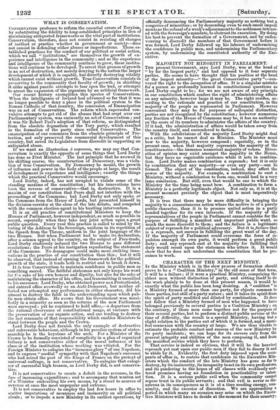MAJORITY NOT MINORITY IN PARLIAMENT.
THE present Government, says Lord Derby, was at the head of "by far the largest party," and had opposed to it four separate parties. He seems to have thought that his position at the head of the largest minority—" the great Conservative party "—con- veyed the right to the occupation of office. It is a singular mistake for a person so profoundly learned in constitutional questions as Lord Derby ought to be ; for we are not aware of any principle in our constitution which confers the right of administering affairs on any minority, however large it may be. The right resides, ac- cording to the rationale and practice of our constitution, in the majority of the people as represented in Parliament. However convenient they may be for purposes of colloquial distinction, parties are not recognized by the constitution ; however numerous any fraction of the House of Commons may be, it has no authority on the score of its numbers to administer the affairs of the country. If it had, the administration of affairs would be taken away from the country itself, and surrendered to faction.
With the subdivisions of the majority Lord Derby might deal as a critic but he cannot deal as Minister. The Minister must bow to the majority, however composed ; especially, as in the present ease, when that majority represents the majority of the constituencies—the immense numerical majority of voters. Diver. sities of opinion may exist amongst the majority in the House, but they have no cognizable existence while it acts in combina- tion. Lord Derby makes combination a reproach; but it is only by combination that any majority—or even any party—can be formed. The object of the combination, indeed, may affect the power of the majority. For example, a combination to oust a Ministry, without a combination to form one, would lead to a very lame conclusion. But still, even that would be one to which the Ministry for the time being must bow. A combination to form a Ministry is a perfectly legitimate object. Not only so, it is at the present moment precisely the object that is most imperatively necessary. It is true that there may be more difficulty in bringing the majority to a consentaneous action where the motive is of a purely public character, than it is to procure united action in a party banded together for its own interests. If the majority of the representatives of the people in Parliament cannot combine for the purpose of fulfilling a manifest and important public want, so ranch the more discredit to them; and the failure is a legitimate subject of reproach for a political adversary'. But it is failure that is a reproach, not success in fulfilling the great want of the day. If the majority of Parliament could overcome the force of re- pulsion amongst its own parts, it would perform a great public duty; and any reproach oast at the majority for fulfilling that duty would recoil upon the statesman who utters it. It would show that he does not understand the constitution that he pre- sumes to work.


























 Previous page
Previous page